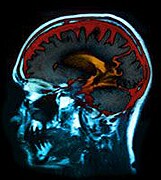
TUESDAY, May 12, 2015 (HealthDay News) — A protein known to accumulate in Parkinson’s disease and other degenerative brain disorders activates the brain’s immune defenses, researchers say.
The protein is called a-synuclein. The researchers noted that diseases such as Parkinson’s and Lewy body dementia are characterized by the abnormal accumulation of this protein. The immune response appears to increase inflammation.
The researchers said the high blood pressure drug candesartan and an experimental drug both reduce the immune response triggered by the protein. But much more research is needed on these findings.
“We have made important progress in understanding how a-synuclein sets up the chronic brain inflammation that is a hallmark of these diseases,” study senior author Kathleen Maguire-Zeiss, an associate professor in the department of neuroscience at Georgetown University Medical Center in Washington, D.C., said in a university news release.
The normal role of a-synuclein is unclear, but it is known that the protein can quickly change its structural shape — “misfold” — and become toxic. Misfolded a-synuclein can activate cells that provide the main immune defense in the central nervous system.
“The real job of [these immune cells] is to keep the brain healthy by getting rid of pathogens as well as cellular debris,” Maguire-Zeiss said. “However, in a diseased state [these immune cells] can become chronically activated, leading to a continuous onslaught of inflammation which is damaging to the brain.”
The study was published online May 12 in the journal Science Signaling.
More information
The U.S. National Institute of Neurological Disorders and Stroke has more about Parkinson’s disease.
Copyright © 2026 HealthDay. All rights reserved.

